Ageing Well in Place at Meredith Court
Tenant-led survey and research by Aquarius Community Savers and Aquarius Tenants and Residents Association.
- Published
- 09/10/2024
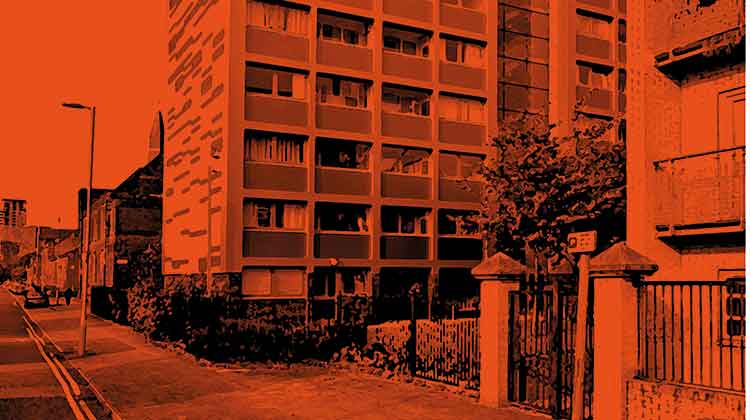
1. Introduction
2. Methodology
3. Ageing Well in Place in Hulme’s Tower Blocks: Local context
Notes of quotations
The report is a mix of direct quotes and paraphrased comments from tenants. The responses were handwritten by a mixed team of people and then typed up and anonymised by a professional researcher at Turn2us.
Notes of authorship
The data has been co-produced with the tenant community researcher team, many of whom represent Aquarius Community Savers and Aquarius Tenants and Residents Association, with support from Connor Drake at Turn2us. The report was written up by Abby Meadows, Care Programme Manager at Turn2us.
Biographies
Ageing Well in Place in Hulme partnership
A collaboration between resident groups, charities, housing providers, universities and Manchester City Council. The partnership’s vision is that elderly and vulnerable tower block tenants in the Aquarius and St George’s estates are living well and with dignity in the place they call home.
Current partners: Aquarius Community Savers, Aquarius Tenants and Residents Association, Community Led Action and Savings Support (CLASS), Cornbrook Medical Practice, Integrated Neighbourhood Team Manchester City Council, Manchester School of Architecture, Manchester Urban Ageing Research Group, One Manchester and Turn2us.
Aquarius Tenants and Residents Association (ATARA)
ATARA is for local people and acts as a platform for the community, to promote engagement which makes positive change in the area. They provide feedback on issues that are important to local people and make sure that the views of local people are heard.
Aquarius Community Savers (ACS)
ACS organise together to improve life for older tower block tenants living on the Aquarius estate in Hulme and run a weekly savings club.
Community Led Action and Savings Support
CLASS is a charity that provides development support to residents of Hulme and primarily savings groups affiliated to the Community Savers network. It supports and facilitates women-led community and coproduction processes focused on poverty reduction.
It supports savings groups to network together and with other groups through community exchanges and dialogues, to share ideas and strategies for reducing urban poverty and inequality.
Turn2us
Turn2us is a national charity offering information and practical support to people facing financial insecurity. Our Local Programmes team works in partnership with a community for up to 10 years to help people build financial security and thrive.
1. Introduction
Turn2us’ Care Programme is a ten-year programme which aims to make people in Greater Manchester, who struggle with the cost of care, financially secure. Meredith Matters is a new Care Programme project being co-produced by Aquarius Community Savers; Aquarius Tenants and Residents Association; Community Led Action and Savings Support; On Top of the World project and the Turn2us Care Programme team.
The first phase of the Meredith Matters project has been tenant-led research in social housing tower block Meredith Court. The research aimed to understand the experiences of Meredith Court tenants in relation to the cost of care and to build tenant leadership at Meredith Court.
The research project builds on previous learning from the Ageing Well in Place in Hulme pilot project at Hopton Court (led by Aquarius Community Savers with support from CLASS).
The long-term vision is that tenants across the six tower blocks in the Aquarius estate go beyond data gathering and advocate for the changes tenants want to see at the block and among local services.
The findings in this report are from the research led by tenants with support from CLASS and Turn2us. The research aimed to find out about tenants’ lives, their financial security and how they are impacted by the care system. We considered unmet care needs, unpaid or underpaid care work, and statutory/private social care provision within this framework.
This report contributes to the growing evidence base about the needs, strengths, and aspirations of people living in tower blocks on the Aquarius estate.
In neighbouring tower block Hopton Court, there is an impressive history of designing community-led solutions to the socio-economic challenges tower block tenants face, with a focus on supporting older people.
To do this, they follow a Naturally Occurring Retirement Community (NORC) model, which they define as “an age-integrated housing development or neighbourhood that originally contained different age groups, but which over time has become home to a concentration of older adults, 55 years of age and older.”
A NORC aims to see older people living well in their homes with their care needs met.A similar survey and report were carried out in Hopton Court in 2021.
The learning from this NORC project was that two key roles are needed to deliver it successfully; an Independent Living Worker and a Naturally Occurring Retirement Community Worker.
2. Methodology
The data presented in this report came from the following sources:
- 1. Survey results from 26 tenants at Meredith Court.
- 2. Case study interviews carried out with three Meredith Court tenants.
- 3. Interview with a GP partner at Cornbrook Medical Practice.
Project team
The project team delivering this research was made up of nine residents from across the Aquarius estate – including tenants at Hopton Court and Meredith Court – and four staff members from CLASS and Turn2us.
Most members of the project team have been involved in previous community research, most notably the research carried out in Hopton Court, and a Cost-of-Living survey carried out at six Aquarius tower blocks in June 2022.
Community researcher training
There were six training sessions delivered by a professional researcher (employed by Turn2us).
The sessions combined research training and the co-design of the survey. The survey and accompanying materials (including a service information booklet, participant information booklet and consent form) were piloted by the project team and adapted according to their feedback until they were satisfied the questions were suitable and relevant to the community.
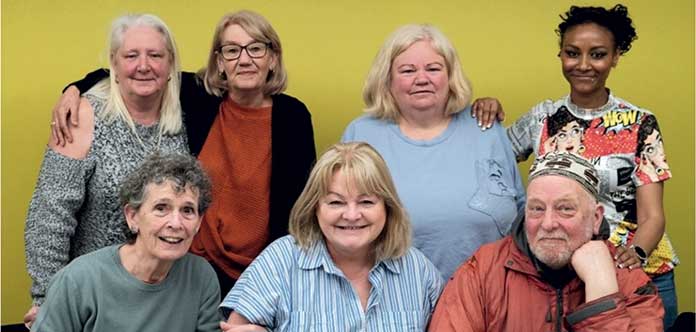
Community engagement
Engagement with the Meredith Court community began in Autumn 2023 through a series of ‘light-touch’ community stalls in the grounds of the tower block, where residents were offered a cup of tea and slice of cake, and initial conversations began about experiences of living in Meredith Court and social care.
These culminated in a festive event at the tower block, where residents cooked and shared food, and continued to discuss life in the block. The aims of these engagements were for the project team and residents to get to know each other better; to raise awareness about the upcoming research project, and to begin to get a sense of the key issues affecting the Meredith Court community.
The project team then held a series of ‘tea and chat’ events to build the profile of the project team and further spread the word about the upcoming survey. This included asking people what languages are spoken and whether people would need translators.
Data collection and analysis
The data collection period started with a launch event, where Meredith Court tenants had an opportunity to seek advice and information from local service providers including the local GP and housing provider.
The survey took place between the 28th May – 7th June 2024, and residents from 26 out of a total of 68 flats participated (38%).
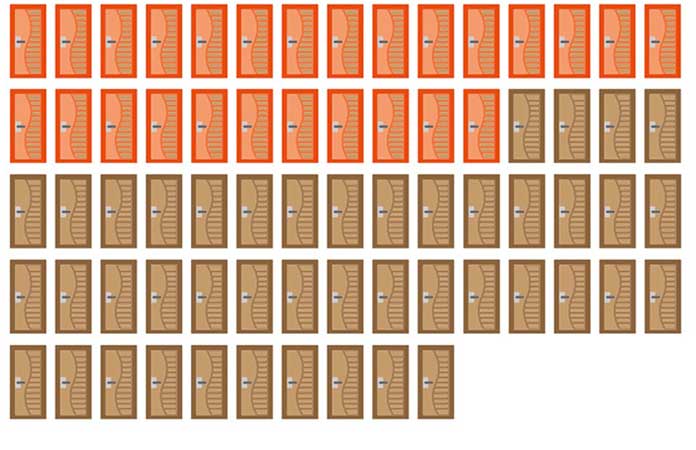
Survey results were collated and analysed by our in-house researcher and verified with the project team and the wider tenant community through presentation of interim findings.
These validation processes highlighted that some of the results on health status were misleading. We consider the reality to be that there are much higher rates of physical and mental health conditions than the survey findings suggest.
This is supported by data provided by Cornbrook Medical Practice (the local GP surgery) which shows that of the 68 Meredith Court tenants registered at the practice, around four in ten (38%) have a diagnosis of anxiety or depression.
The project team concluded that these contrasting findings resulted from: the subjectivity of our question phrasing (such as defining your health as ‘fair’ or ‘good’), the cultural differences in how people perceive good health, and the shame and stigma that can be associated with physical and mental health conditions.
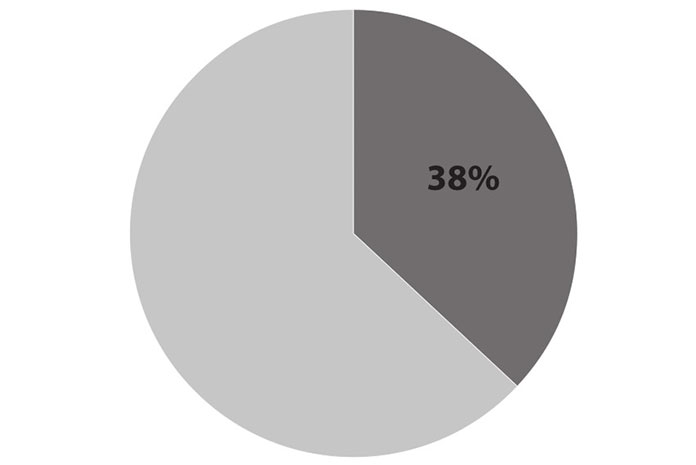
Ethics
Ethics was covered in a range of topics during the training sessions, such as safeguarding, confidentiality, GDPR and informed consent.
The training content and survey questions were reviewed by Dr Sophie King, Director of CLASS and Honorary Research Fellow at the University of Manchester. Turn2us provided supermarket vouchers to say thank you to participants.
Community Researcher experiences
Peer mentors (who had led the previous research at Hopton Court) supported other residents to get involved in delivering the survey and teaching people about the NORC.
This peer mentor team has strengthened their leadership skills and expertise in ways which built their capacity to support more tenants in other tower blocks and neighbourhoods to realise their potential as community leaders and advocates for change.
Community researchers expressed real enjoyment of the process, people described it as “eye-opening” and “impressive”. Moreover, one person said it was a “living, breathing NORC (Naturally Occurring Retirement Community) project”.
Case study 1
I want to keep working with Meredith Matters project and things at Aquarius (Community Centre). I can’t think how I managed all day without the project, I’m quite busy now with things to look forward to and keep busy with. I want to take a lead on some things and maybe upskill so I can do that. Going to Wednesday drop in at Aquarius has started me saving with community savers. I’m joining the community savers committee and want to spread the word throughout Meredith. I definitely wish I’d known about this before, I didn’t know what I was missing.
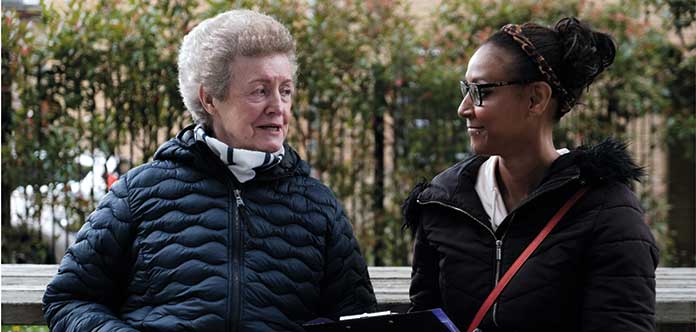
3. Ageing Well in Hulme’s Tower Blocks: Local context
There are 12 tower blocks in Hulme which are mostly located within or along the boundary of two areas called Aquarius and St George’s.
They house a large proportion of older people. Hopton Court and Meredith Court have the highest percentage of older people (50+): 75% and 46% respectively.
These two blocks also house the highest number of older people (50+) living alone: 91% of Meredith Court and 96% of Hopton Court. Moreover, 30% of older residents report day-to-day activities being limited “a lot” due to long-term health issues, which is over 50% higher than the national average2.
Cornbrook Medical Practice (CMP) have also been able to provide a small amount of wellbeing data on their registered patients at Meredith Court.
This data suggests that, of the 68 patients registered as patients and living at Meredith Court, one in five (21%) have a chronic illness (including COPD, heart disease, asthma and diabetes), around a third (32%) receive more than five repeat medications per month and around four in ten (38%) have a diagnosis of anxiety or depression.
| Manchester - 019 Hulme and University3 | Manchester average | England average | |
|---|---|---|---|
| Older people in deprivation (2019) | 45.2% | 33.6% | 14.2% |
| Older people living alone (2011) | 49.8% | 39.7% | 31.5% |
| Emergency hospital admissions 2016-17 to 2020-21 (Standardised Admission Ratios) – where England is 10 | |||
| For coronary heart disease | 179 | 154.6 | 100 |
| For stroke | 150.2 | 149 | 100 |
| For heart attack | 135.4 | 127.9 | 100 |
| For Chronic Obstructive Pulmonary Disease (COPD) | 209.5 | 220.3 | 100 |
- This section of the report presents data from national and official sources (including from Public Health England’s Fingertips portal and the Office for National Statistics), as well as insights from the local GP’s surgery, Cornbrook Medical Practice.
- Department of Work and Pensions (2018) Pension Credits Quarterly Statistical Enquiry – N.B this dataset is no longer produced.
- We have focused on one Mid-Layer Super Output Area (MSOA) which roughly maps onto what people consider locally to be the Aquarius estate. MSOAs are small geographical areas which contain populations between 5,000-15,000 residents. The total estimated population is 14,646, of which approximately 8% (1,183) are aged Over 50 (Office for National Statistics, 2019)
4. Survey findings
This next section outlines the demographics of those who took part in the survey and the survey results, which can be understood as three main themes:
- Cost of Living: 81% of participants reported that they couldn't comfortably afford energy costs.
- Social Isolation: 46% of participants saw family or friends about once a fortnight or less.
- Health Inequalities: 46% of participants reported having a long-term health condition.
Demographics
To get an understanding of the people who completed the survey, we asked some demographic questions.
The total estimated population is 14,646, of which approximately 8% (1,183) are aged over 50 (Office for National Statistics, 2019).
|
|
# | % |
|---|---|---|
| Gender | ||
| Men | 20 | 77% |
| Women | 6 | 23% |
| Age | ||
| Aged 45+ | 17 | 65% |
| Aged 55 – 64 | 7 | 27% |
| No response given | 2 | 8% |
| Disability | ||
| Disabled | 10 | 38% |
| Preferred not to say | 5 | 19% |
| No response given | 11 | 57% |
| Tenure | ||
| >10 years | 16 | 61% |
| >20 years | 6 | 23% |
| No response given | 4 | 16% |
| Occupancy | ||
| Solo | 20 | 77% |
| Multiple | 4 | 15% |
| Preferred not to say | 2 | 8% |
Ethnicity
| Ethnicity | # | % |
|---|---|---|
| Afghan British | 1 | 4% |
| Arab | 2 | 8% |
| Black African | 4 | 15% |
| Black African and White | 1 | 4% |
| Black Caribbean | 1 | 4% |
| Black Caribbean and White | 2 | 8% |
| Indian | 1 | 4% |
| Mancunian Celtic | 1 | 4% |
| Middle Eastern British | 1 | 4% |
| Prefer not to say | 1 | 4% |
| White British | 11 | 42% |
Findings 1: Cost of living
The survey results showed that most tenants face some financial security issues. The main costs tenants were struggling with were transport for health appointments, energy, fresh healthy food and clothing.
Fifteen people (58%) reported being unable to comfortably afford taxis, bus fare or fuel to get to appointments.
“Money is a big problem”
Nine people (35%) got prescriptions for free, whereas five (19%) didn't need them and six (23%) preferred not to say.
“I have worked for 35 years but am now on low benefits. I need help with PIP.”
Twenty-one people (81%) reported that they couldn't afford energy costs comfortably.
“Repaying the electricity company is very expensive since I can no longer work due to my health condition.”
Seventeen people (65%) reported being unable to afford fresh, healthy food comfortably.
Sixteen (62%) people reported not being able to afford appropriate clothes comfortably, with eight (30%) unable to afford them at all.
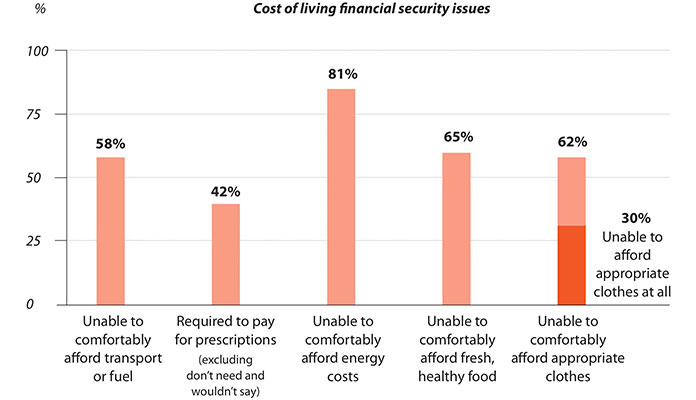
Case Study 2
Ann moved to Manchester from West Africa in the early 2000s and has lived at Meredith Court for 20 years. She is in her 60s. She worked for many years as a support worker for young people with learning disabilities and eventually retired for health reasons.
When she stopped work, Ann noticed how disconnected everyone was at the block. She says that “this is a place where people mind their own business...in the morning everyone is gone away, when you come in at night after work you find something to eat and sleep so you don’t meet people.”
Although her arthritis affects her mobility, Ann says she can go to the shops “when I am not in too much pain, or the weather is not too bad”.
Her son visits once a fortnight to take her to appointments. Since being assessed as having limited capability for work, Ann has been on universal credit and is struggling to make ends meet particularly in terms of electricity costs.
She used to pay by Direct Debit when she was working but when she stopped work, she was advised to move to a pre-payment meter. She finds that £30 only lasts her about 3 days and ‘when it’s gone, it’s gone’. She recently found out that she may be eligible for a free bus pass, but she no longer has Wi-Fi and doesn’t know how to apply.
Findings 2: Social isolation
The findings suggest that there are significant levels of social isolation amongst residents at Meredith Court.
Family, friends, and social contact
A total of 46% of participants saw family or friends about once a fortnight or less and 35% said they don't have enough or would like more social contact. In addition, 58% of respondents do not have family living in the local area.
|
|
# |
|---|---|
| Have family in Hulme or Manchester | 9 |
| Do not have family in Hulme or Manchester | 15 |
| Prefer not to say | 2 |
Getting out and about, and getting on at home
When asked which statement best describes their situation over the past twelve months, participants provided the following responses:
|
|
# |
|---|---|
| I have been able to get to all the places in my local area that I want | 14 |
| At times I have found it difficult to get to all the places in my local area that I want | 3 |
| I rarely leave my flat | 3 |
| No answer/prefer not to say | 5 |
| I have mostly been unable to get to all the places in my local area that I want | 1 |
In response to our questions about the impact of money on socialising:
- Fifteen people (58%) reported that money was a barrier to socialising, whereas eight (31%) reported that it was not.
In response to questions about accessibility:
- 12% of participants reported that none of the rooms in their flat are accessible for their needs;
- 24% said two rooms or less were;
- 62% reported all the areas of their flat (including bedroom, living room, kitchen and bathroom) were accessible.
When asked what they would love to happen in Meredith Court, one person said:
“Change the bathroom so I don't have to climb in the shower – I want a walk-in shower.”
“View back and front of building is depressing. I have bricked buildings facing me, I feel like I'm in a prison. The sun doesn't shine through, it's always cold inside because other buildings block the light”.
How do people spend their spare time?
We also asked survey participants how they like to spend their time, and participants provided a variety of responses including:
- Socialise with friends.
- Bit of a loner now, older friends have died.
- See family rarely − Christmas, birthdays etc.
- Attend Aquarius (Community Centre).
- Watch TV, especially sport programmes.
- Used to enjoy musical festivals but due to chronic illnesses [I'm] unable to.
Findings 3: Health inequalities
There is clear evidence in the local census data, from the local GP surgery, anecdotal evidence, and a wide range of statistics about older and disabled people more generally, that there are significant health challenges at Meredith Court.
As explained earlier, some of our survey findings on health status have been misleading which we believe is linked to a reticence among some respondents to discuss personal health information on the doorstep, mental health stigma, and generally wanting to be seen to be ‘doing ok’.
Family, friends, and social contact
Our results showed that 35% of people reported that their physical health was ‘fair’ and 34% said it was ‘good’ (19%) or ‘very good’ (15%).
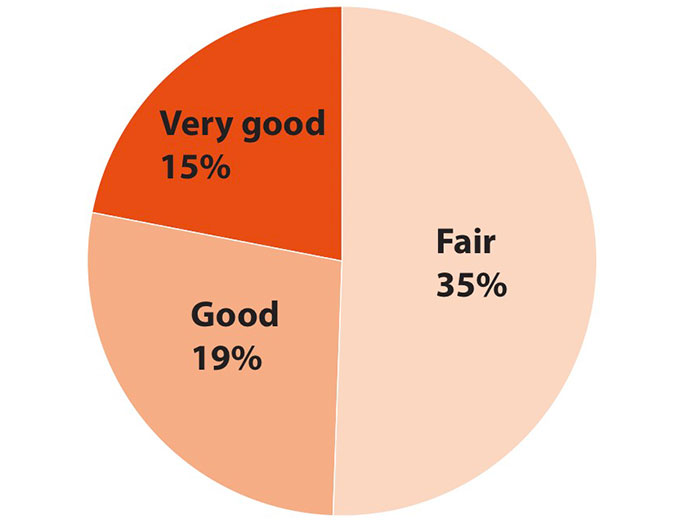
We believe that the wording ‘fair’ masks a diverse range of conditions and experiences which some participants were able to articulate:
Sleep apnoea has ruined my life for years.
The mice are affecting my mental and physical health; they give me allergies and make me very anxious.
Further to this, 46% of people reported having a chronic or long-term health condition. This is supported by the data provided by local GP Cornbrook Medical Practice which shows that 21% of Meredith Court residents registered with the practice have chronic illnesses (including COPD, heart disease, asthma and diabetes).
Case Study 3
Jay is a 62-year-old male who has lived in Meredith for 26 years. He has several long-term health conditions, including a complex lung condition. He enjoys going out to play pool when he can which isn't often due to financial reasons.
He has worked all his life and has a small pension which excludes him from other benefits, and he must pay full rent and council tax. He had no money left to live on after paying all these bills.
One of his issues was being able to access the GP. He remembered having been stood outside the local surgery crying with pain and deciding not to go in anyway because “you can’t get an appointment”. He had not seen a doctor for a number of years despite having a serious health condition.
A member of the research team discussed a possible Personal Independent Payment (PIP) application. He said he tried once before, and his claim was rejected so he thought it was pointless.
Fortunately, during the research process the project team were able to support Jay to see a GP and a money mentor who helped him submit a PIP claim.
Jay said he enjoyed being part of the research as he felt listened to but more importantly was able to get access to services there and then. He said it’s important that we do this as people in the block need it.
He said it was so great having the GP and money mentor on site – it would have taken him months to sort out without this on-site support because: “You get tired and give up”.
With regards to mental health, 50% of people responded that their mental health was fair, while 12% said it was good, 27% very good, 4% very bad and 8% preferred not to say.
Again, we suspect that many participants were using the word ‘fair’ to mean they were experiencing mental health conditions of various kinds, but they were managing to cope.
We know for example that 38% of the Meredith Court tenants registered at Cornbrook Medical Practice are experiencing anxiety or depression.
I'd like my teeth fixed. I'd like to feel happy, just for a day. I'd like to be financially stable.
Just getting to see my GP is very hard. More money would help too.
I feel very depressed most of the time but when I have no money, which is often, I struggle with my depression even more. I feel more secure with money in the bank but still get depressed.
Receiving and giving care
Despite 46% of people having a long-term health condition and ten people being disabled, only 2 of the people we spoke to said they were receiving help from statutory social care services.
| # | |
|---|---|
| In receipt of social care | 2 |
| Not in receipt of social care | 19 |
| Prefer not to say | 5 |
Those people receiving support were more likely to receive this from family members, friends or neighbours:
| # | |
|---|---|
| Receives practical help from friends or neighbours | 6 |
| Receives practical help from a partner or family members | 6 |
| Receives practical help from a partner or family member and from friends or neighbours | 1 |
| Doesn’t receive practical help from any of these groups | 11 |
| Prefer not to say | 2 |
Amongst respondents that said they don’t receive any practical help, there were the following additional comments:
Because I don't have family.
Not been offered, I would like some help in the home.
Temporary carer while my shoulder heals. (This indicates they are receiving help on a temporary basis.)
Of those that do receive some help, there were the following comments:
I see a support worker.
I only communicate with my sister and brother and it's always about borrowing money. They both borrow [sic] me money through the month.
My sister visits now and again to help with laundry and food shopping.
Maintaining the flat, helping with chores etc.
Of those in receipt of social care, one person was also receiving help with their finances and one said: “As I am not on the internet, I am finding it very difficult to access information”.
Providing unpaid care
Most people we spoke to do not provide care for someone in their family or household.
| # | |
|---|---|
| I provide care for someone else in my family/household | 2 |
| I do not provide care for someone in my family/household | 20 |
| Prefer not to say | 4 |
Aspirations for later life
When asked about aspirations for later life, health was mentioned in the following ways:
- “I need to improve my health first.”
- "Whether I want to stay or move [from Meredith Court] depends on my mobility.”
Additional responses included:
I want to stay at Meredith.
Stay here, I'm used to it.
I'll end my days here; I want to stay in Meredith Court.
To have more space for communal gathering.
I need to move.
I would like to live in a different type of accommodation.
5. Summary and next steps
In summary, this survey demonstrates that people have significant barriers to financial security and appropriate care in Meredith Court; people cannot afford living essentials, people do not have enough access to services they need such as a GP and benefit information and some people do not have as much social contact as they would like. This is also evidenced by other research done in this area outlined earlier in this report.
Moreover, it is evident from this tenant-led research at Meredith Court (as well as concurrent tenant-led initiatives at Hopton Court) that tenant-led actions are more likely to be effective and sustainable. Continuing this work would support more tenants to be part of the collective action for improving tenants' lives, including their financial security.
Based on both our survey findings and the plans of the Ageing Well in Place partnership, we are taking the following steps to address the financial insecurity, health inequalities and social isolation in Meredith Court and continue supporting tenant-led initiatives in Meredith Court and across the Aquarius estate.
As previously mentioned, the Ageing Well in Place partnership is proposing to employ two roles that were found to be effective through the NORC initiative at Hopton Court: an Independent Living Worker and a Naturally Occurring Retirement Community Worker.
These roles delivered high impact for Hopton Court tenants in terms of addressing financial insecurity, improving access to services and increasing social connections. They also supported tenants to take the lead on various initiatives such as the creation of a regular breakfast club and social gatherings4.
4 These impacts will be detailed in the upcoming evaluation report by the Manchester School of Architecture who have been supporting the NORC and the Ageing Well in Place partnership.
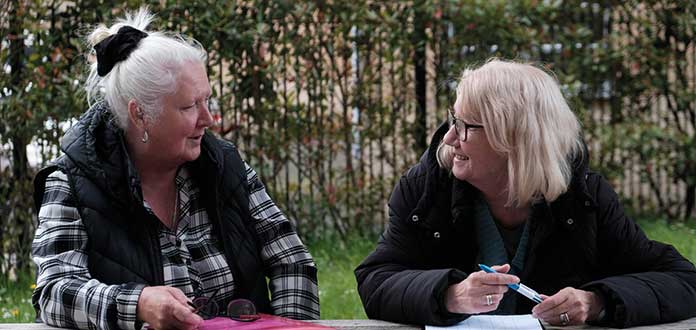
1. Finding external funders
The findings in this report have been analysed by the Meredith Matters project team and discussed with tenants in the context of the wider existing work taking place on Ageing Well in Place in Hulme and the Naturally Occurring Retirement Community model.
It is clear from the survey results that the same ‘solutions’ would work well at Meredith Court as for Hopton Court, as many of the same barriers and challenges have been identified.
Our first recommendation is therefore to seek external funding to support the creation of two critical roles which, together with certain other interventions, will generate significant social value in relation to the small amount of investment required from each funding partner.
This could combine contributions from relevant public, private and third sector organisations including the two universities situated on the doorstep of the Aquarius estate whose developments have had significant impacts on the community over time. We provide more detail below.
2. Recruitment of an Independent Living Advisor (ILA)
The main duties and responsibilities of this worker would include:
- Individual case work with Over-50s tenants.
- Benefits and financial inclusion information and signposting.
- Health and social care advocacy and follow up.
- Relationship building and partnership development with key local service providers and individual workers e.g. GPs surgeries; district nurses; care navigators; mental health and wellbeing services; advice agencies.
3. Recruitment of a Specialist Development Worker
The main duties and responsibilities of this worker would include:
- Confidence and skills building with tenants including digital inclusion.
- Fostering stronger social relationships between tenants within the same block.
- Supporting the development of new tenant associations/leadership groups across the blocks.
- Networking tenants together across the blocks and supporting learning exchange and peer mentorship including for new surveys and tenant-led research, data gathering, and advocacy work.
- Co-creation of programmes of social events with tenants and community groups including skills development, leisure, days out, physical activity, intergenerational activities and projects etc.
- Development and governance of new and existing community spaces and communal areas and gardens to support increased social interaction and inclusion.
4. Support Meredith Court tenants to join Aquarius Community Savers
Aquarius Community Savers is a peer support group and savings club that meets every Wednesday at the Aquarius centre as part of On Top of the World Project’s Seanchai café.
Getting involved in Aquarius Community Savers enables people living on a low income who may be experiencing multiple disadvantages to become better connected and informed about support and services while also being able to save small amounts of money for particular goals.
5. Recommendation for a block-wide needs assessment
Independently of the above actions there is an urgent need for collaboration between One Manchester and Manchester City Council to ensure that a block-wide social care needs assessment is carried out to ensure Meredith Court flats are fully accessible for older people and disabled people, and that people have access to the social care support, services, and essential items that they need.